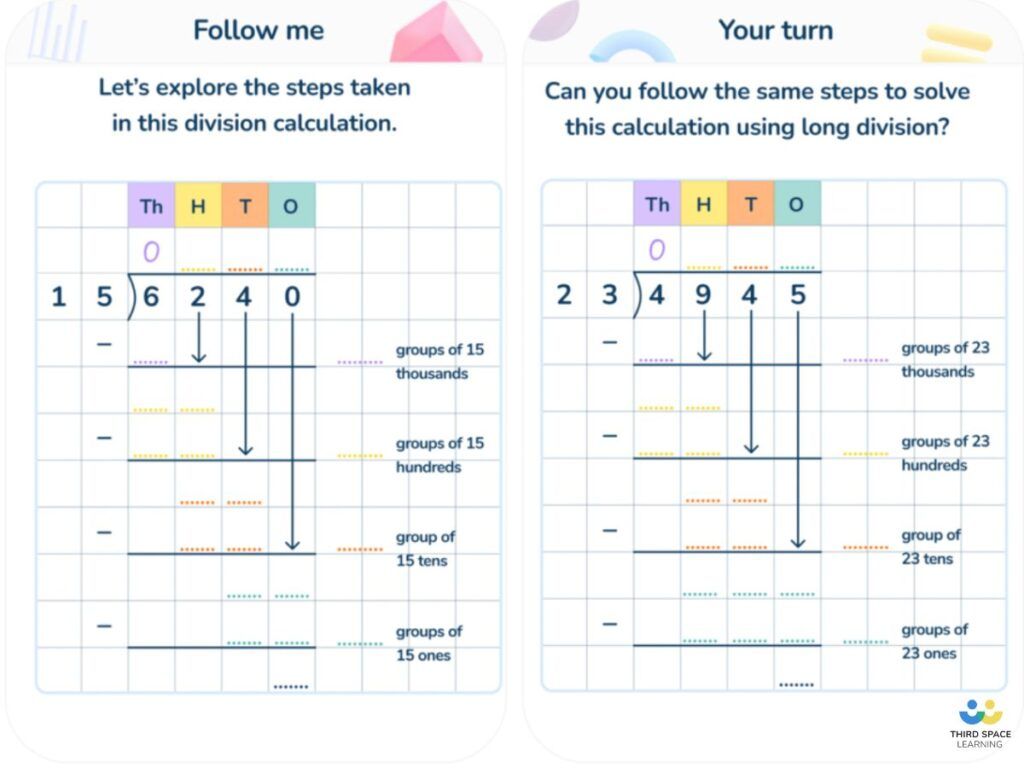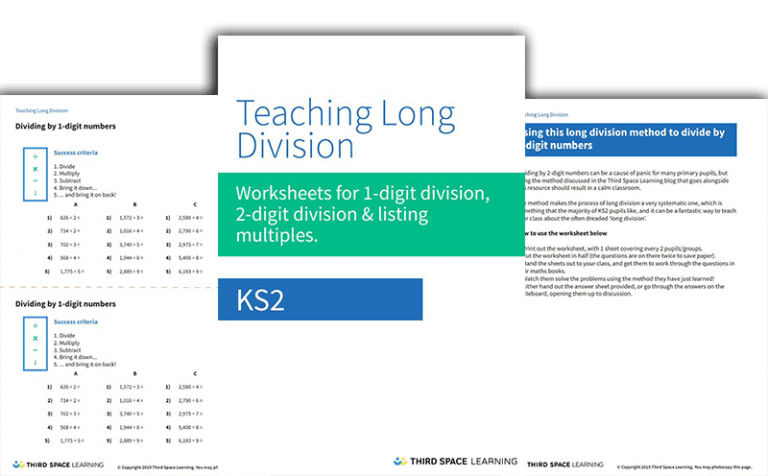Long Division Questions That Will Test All Pupils From Year 6 To Year 11
Long division questions are designed for students to practise dividing large numbers such as a four digit number by a two digit number or a three digit number. When larger numbers are involved, it is no longer practical to use short division (the bus stop method).
Here is a selection of long division questions you can share with your students to help them work through the steps involved in long division.
Long division key terminology
Let’s recap some key points:
- The division symbol looks like this: ÷
- The dividend is the number we are dividing.
- The divisor is the number we are dividing by.
- The quotient is the quantity produced by the division.
What is the long division method?
We can think of long division as a step by step process in which the steps are repeated until the calculation is complete. It is best used when working with multi-digit divisors and dividends.
When completing a long division calculation, the first thing we do is write out the first 9 multiples of the divisor. This makes the next steps a lot easier. Once we have done this, we can follow these long division steps:
- Divide
- Multiply
- Subtract
- Bring the next digit down
If you have been struggling to teach long division to your Year 6 class then this post on the long division method step by step will prove invaluable!

3 Free Long Division Worksheets For KS2
Get some free, ready to use long division worksheets for your class, all of which were created by a primary teacher!
Download Free Now!Long division question example
Let’s look at an example:
1752 ÷ 24
First write out the first 9 multiples of 24. This can be worked out either using partitioning or by repeated addition. By writing out the multiples of 24, you are saving yourself the time of working through the 24 times table mentally several times as well as ensuring you make less mistakes.
Multiples of 24:
24, 48, 72, 96, 120, 144, 168, 192, 216, …
Now follow the steps:
- Divide: Divide 175 tens by 24.
The answer is 7 – I can see this from my multiples, so I write 7 on my answer line in the tens column as the first digit of my answer. - Multiply: 24 x 7 = 168 (Again I can see this from multiples). Ensure you align the place values correctly when placing this on the grid.
- Subtract: 175 – 168 = 7.
- Bring down: bring down the 2 from the ones column.
Repeat:
- Divide: Divide 72 by 24.
The answer is 3 – I can see this from my multiples. - Multiply: 24 x 3 = 72
- Subtract: 72 – 72 = 0
- The answer to the subtraction here is 0, therefore the remainder is zero and we are finished.
In some long division problems the divisor does not divide the dividend a whole number of times and in these cases the answer may be written with a remainder, a decimal or a fraction.
The national curriculum states that we need to be able to interpret remainders as whole number remainders, fractions, or by rounding, as appropriate for the context.
Long division questions KS2
Long division questions in upper KS2 typically involve 2 digit numbers as divisors. Students learn the process of long division and then apply the same method of how to divide numbers to reasoning and word problems. Before tackling long division problems, it is important that students have a good understanding of the basic multiplication and division facts.
Long division questions year 6
1. Work out the answer to 595 ÷ 7




The multiples of 7 are: 7, 14, 21, 28, 35, 42, 49, 56, 63, …
2. Calculate 4488 ÷ 34




The multiples of 34 are: 34, 68, 102, 136, 170, 204, 238, 272, 306,…
3. Work out 6720 ÷ 25




The multiples of 25 are: 25, 50, 75, 100, 125, 150, 175, 200, 225, …
4. Calculate 9129 ÷ 68 . Give your answer as a mixed number (a whole number and a fraction).




The multiples of 68 are: 68, 136, 204, 272, 340, 408, 476, 544, 612, …
5. What is the remainder when 3810 is divided by 47?




The multiples of 47 are: 47, 94, 141, 188, 235, 282, 329, 376, 423, …
Long division SATs questions
6. Nadim is calculating 4482 ÷ 54. His calculation is shown below.
Nadim has made a mistake. Which of the circled numbers is incorrect?




0 is incorrect. He should have brought the 2 down.
7. A zoo charges £13 per ticket. In one day the zoo took £6,136 in ticket sales. How many people visited the zoo that day?




The calculation we need to do is £6,136 ÷ 13
The multiples of 13 are: 13, 26, 39, 52, 65, 78, 91, 104, 117, …
472 people visited the zoo that day.
8. Sophia is going to make some bracelets. Each bracelet uses 77 beads. Sophia has 3500 beads. How many bracelets can Sophia make?




We need to work out 3500 ÷ 77
The multiples of 77 are: 77, 154, 231, 308, 385, 462, 539, 616, 693, …
Sophia can make 45 bracelets. She will have 35 beads left over.
9. A shopkeeper sells pineapples for 93p each. One week he sells £91.14 worth of pineapples. How many pineapples did he sell that week?




£91.14 is the same as 9114p. In this case it makes more sense to multiply by 100 and work in pence than to work with decimals.
9114 ÷ 93:
Multiples of 93: 93, 186, 279, 372, 465, 558, 651, 744, 837, …
He sold 98 pineapples.
10. Below is a calculation. Some numbers have been covered up.
What number should appear in place of the triangle?




Subtracting 136 from 1__0 gives us 54.
136 + 54 = 190, so the number under the square should be 9.
68 + 19 = 87, so the number under the triangle should be 7.
(The number under the circle should be 6 since 1 multiplied by the number gives us 68.)
For more KS2 division practice and additional long division questions, download these free practice worksheets.
Long division in KS3 and KS4
Long division is not taught explicitly in KS3 and KS4 but it can come in useful when solving division problems. It is expected that students can apply multiplication and division skills such as long multiplication and long division across all areas of the KS3 and KS4 curriculum. Below are some examples of questions from KS3 and KS4 where long division could be applied.
Long division questions KS3
11. Lucy buys a car for £7500. She pays £4080 up front and splits the rest of the cost over 36 months. Work out how much she pays each month.




£7500 – £4080 = £3420.
She has £3420 to pay so we need to calculate £3420 ÷ 36
The multiples of 36 are: 36, 72, 108, 144, 180, 216, 252, 288, 324, …
She will pay £95 each month.
12. The area of this rectangle is 1224cm ^2 .
Find the length of the base of the rectangle.




Since area = base × height, 1224 = base × 17
We need to calculate 1224 ÷ 17
The multiples of 17 are: 17, 34, 51, 68, 85, 102, 119, 136, 153,….
The length of the base is 72cm.
Long division questions KS4
13. The probability of winning a game is \frac{3}{13} . If 845 people play the game, how many would you expect to win?




We need to calculate \frac{3}{13} of 845.
845 ÷ 13:
The multiples of 13 are:
13, 26, 39, 52, 65, 78, 91, 104, 117, …
65 × 3 = 195
You would expect 195 people to win.
14. Solve the equation 23(2x + 1) = 1219




The multiples of 46 are: 46, 92, 138, 184, 230, 276, 322, 368, 414, …..
x = 26
Looking for more long division questions and resources?
Third Space Learning’s free GCSE maths resource library contains detailed lessons with step-by-step instructions on how to solve long division problems at secondary, as well as long division worksheets with practice questions and more GCSE exam questions.
For primary school teachers, have a look at this guide on teaching division at KS2 and these long division examples to support your teaching.
DO YOU HAVE STUDENTS WHO NEED MORE SUPPORT IN MATHS?
Every week Third Space Learning’s maths specialist tutors support thousands of students across hundreds of schools with weekly online maths tuition designed to plug gaps and boost progress.
Since 2013 these personalised one to one lessons have helped over 150,000 primary and secondary students become more confident, able mathematicians.
Learn about the scaffolded lesson content or request a personalised quote for your school to speak to us about your school’s needs and how we can help.





